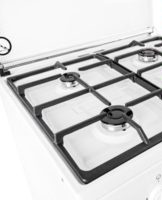Top 10 best tools for cleaning pipes and folk recipes, prevention
The sewage system is used for the disposal of waste water. Clogged water discharge or complete blockage of pipes means that it is impossible to live in an apartment or a private house: cooking, washing hands, taking a shower, bathing, using the toilet. Household tools for cleaning drain pipes allow you to solve the problem yourself, in a short time.
Content
- 1 Reasons for contamination
- 2 Varieties of chemicals
- 3 Rules for choosing the composition
- 4 An overview of the best cleaning products
- 5 Folk recipes for cleaning
- 6 How to determine the location of the blockage
- 7 Mechanical methods
- 8 Dismantling and cleaning the siphon
- 9 Hydrodynamic cleaning methods for private homes
- 10 How to get rid of the smell
- 11 Prophylaxis
Reasons for contamination
Spillway pipes clog due to the design features of the pipelines (presence of bends, bends, where the water velocity slows down) and the entry of waste (food, construction) and hair into the system.
Rust (from inside)
Due to metal corrosion, scale falls from the walls of the pipes. The hydrated iron residue closes the drain lumen, causing a blockage.
Calcium precipitate
Water containing more than 200.4 milligrams of calcium ions and 121.6 milligrams of magnesium ions is called hard water. In places where water stagnates, calcium ions precipitate, forming limestone on the walls of pipes and siphons.
Sand
Sand from building materials falls into the drain and settles at the bottom of the knee, in the places of the elbows, clogging the drain.
body fat
The fatty solutions thicken and settle on the walls if the water pressure was insufficient and short-lived.
soap waste
The soap loses its solubility in cold water and settles on the walls, coating other types of debris in the drain.
Hair, animal fur
In the absence of safety nets for the evacuation of bathrooms, showers, washbasins, the hair falls into a siphon, gets tangled. Hair plugs are wrapped in soap, sand and dirt are retained in them.
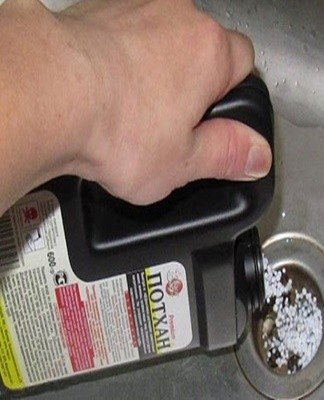
Other waste from human activity
Waste vegetables, fruits and meat products end up in the sewers. They settle in the siphons of sinks, toilet bowls, obstructing the light and creating a blockage.
Improper installation of pipes
The sewage system is installed in compliance with the technical conditions.
Sanitation must meet the requirements:
- by the angle of inclination of the drainage pipes with respect to the riser;
- corners of connections of siphons and branch pipes;
- the rules for fixing the elements.
Any violation will lead to blockages.
Lack of prevention
The sewage system requires regular inspection of all elements for wear, the condition of the fastening, flushing of the drain lines with special solutions.
Varieties of chemicals
Household chemical manufacturers offer a variety of sewer cleaners based on chlorine or caustic soda.
Liquid
Liquid solutions are selected when a blockage has formed near the drain. Toxic compounds in contact with the skin can cause chemical burns.
In powder
The action zone of the powders is limited by a siphon. They are safer than liquids and take time to dissolve in water.
Gelatinous
Gels have a higher water density and penetrate deeper into the drain than liquids and powders. May cause burns on contact with skin.
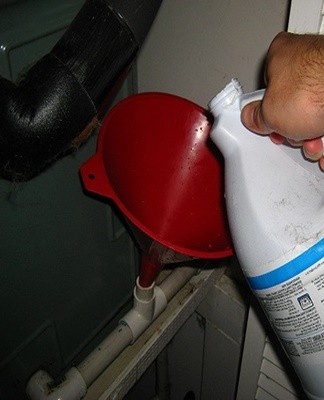
In pellets
Granular preparations are the safest for humans: they do not leave traces on the skin. The dissolution period is long.
alkalis
Caustic soda, caustic potassium are used as solvents for blockages in sewer lines. Available in the form of granules, powder or gel.
Rules for choosing the composition
When choosing a cleaning agent, they are guided by:
- to the place of blockage;
- his diploma ;
- pipe and siphon material.
The drug should be low in toxicity, effective and affordable.
An overview of the best cleaning products
The composition of effective anti-blocking agents includes caustic alkalis, chlorine-containing compounds. Additional components that accelerate the removal of the debris plug are surfactants. Flavored additives neutralize unpleasant odor from purifier and sewage fumes.
"Mole"
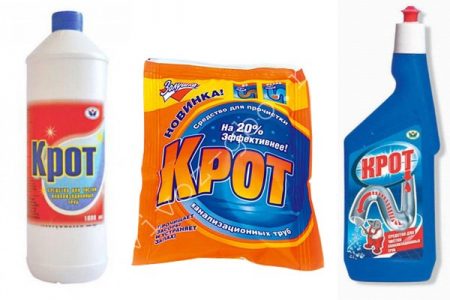
According to its composition, “Mole” designates alkaline agents. From 45 to 70% of its composition is caustic soda and caustic potassium (NaOH and KOH). The product is available in the form of gel, liquid, granules and powder.
The tool is used strictly following the instructions of the manufacturer's instructions.
"Flip"
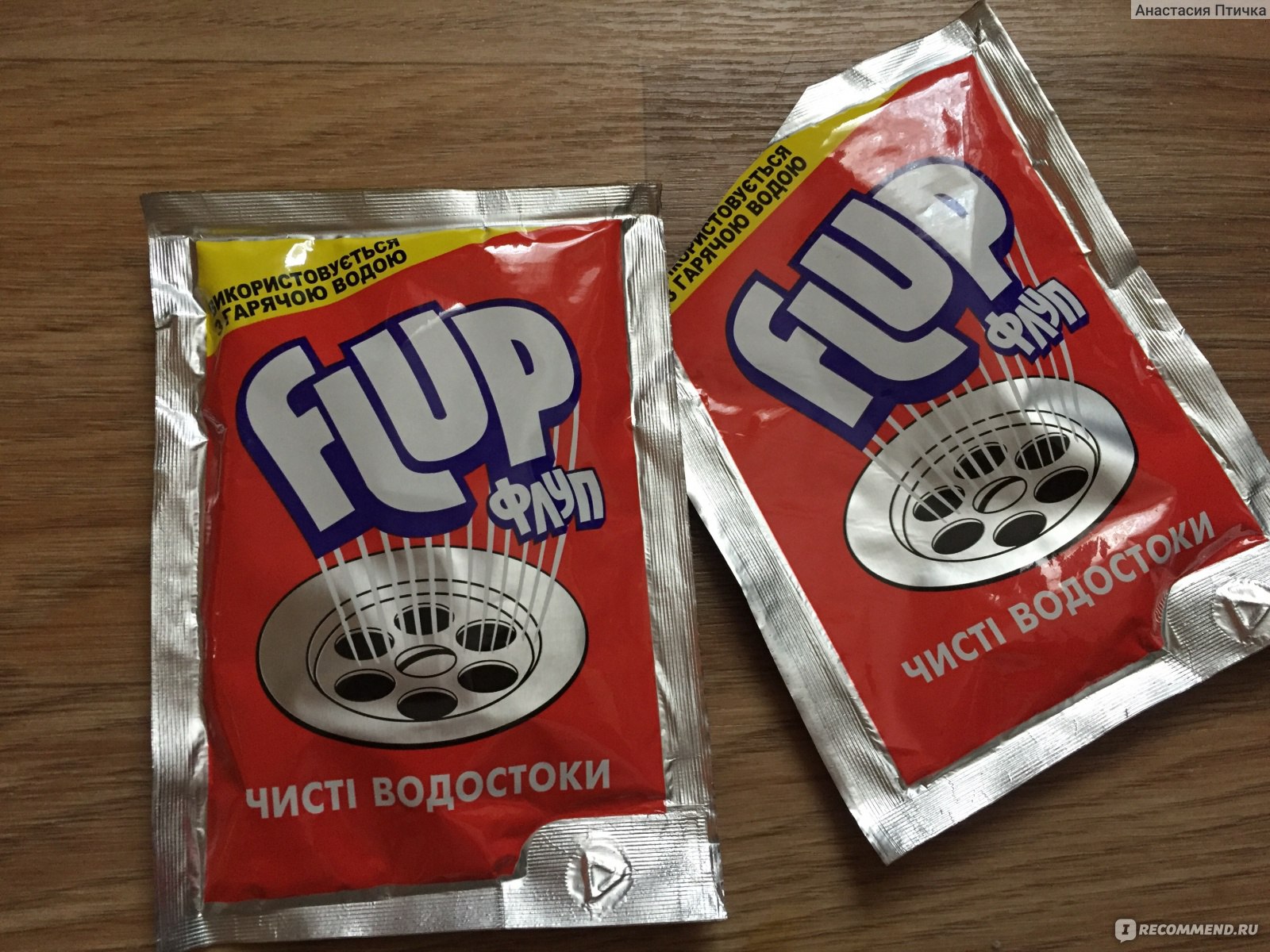
Form of release - granules. The disposable bag contains 80 grams of caustic soda and sodium carbonate.
Do not use beyond the expiration date.
“Sanox. Net flow"
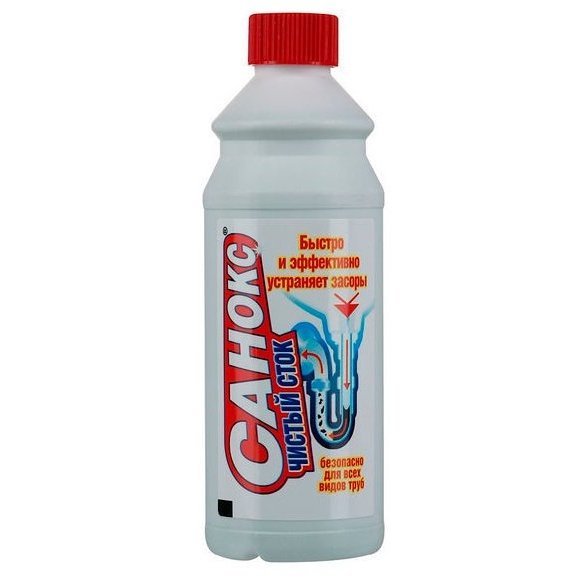
Sewer line cleaner gel contains up to 30% caustic soda and 70% surfactants.
A distinction must be made between “Sanox” for cleaning pipes and “Sanox” for cleaning sanitary appliances.
Chirton "Clean the gutters"
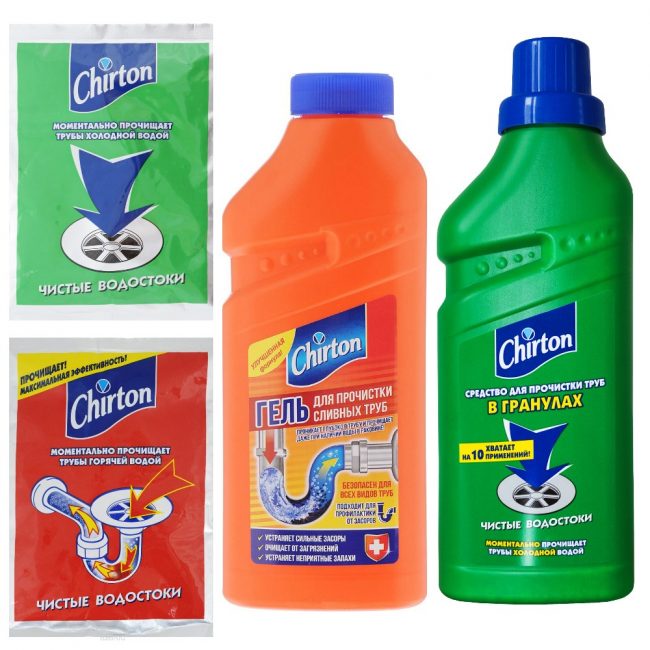
The product is available in the form of powder, granules, liquid and gel.The active ingredients are caustic soda, sodium nitrite.
Cleaning should not be repeated more than 2 times in a row, so as not to damage the pipes.
"Mr Muscular"
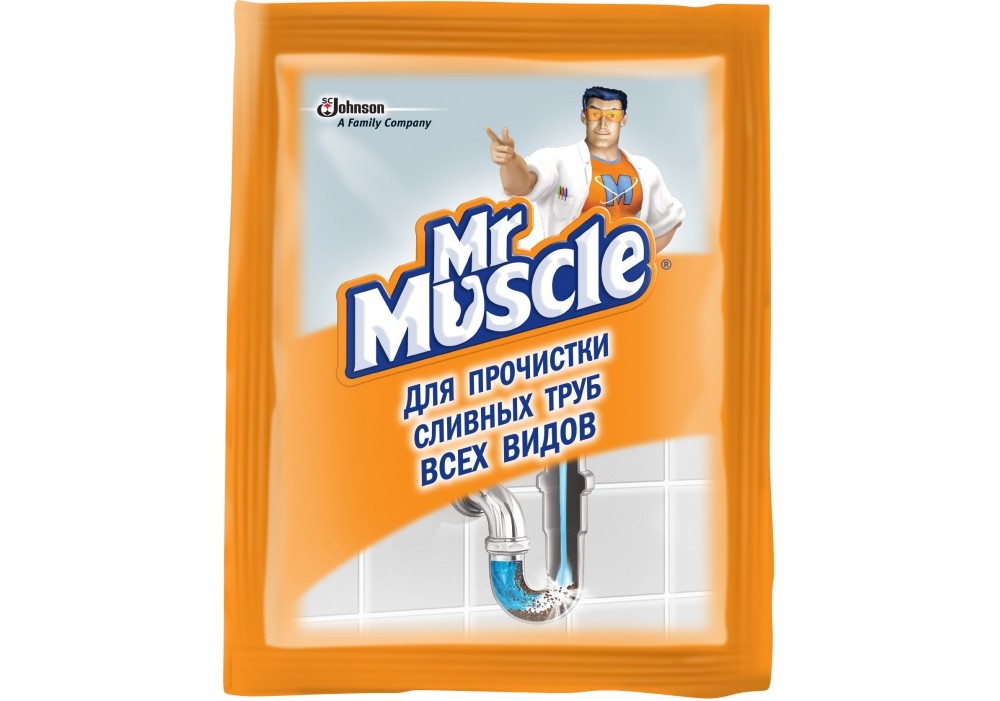
Caustic soda (NaOH) based cleaner. Available in powder form. Recommended for clearing blockages in low pressure drain lines.
To prevent an aggressive substance from entering a chemical reaction in advance, the manufacturer's instructions should be followed.
Active unblocker

The product contains caustic alkalis, surfactants. The gel structure allows deep penetration into the pipes, breaking up organic deposits on the pipes.
The amount of agent and the exposure time depend on the degree of blockage.
Bagi Pothan
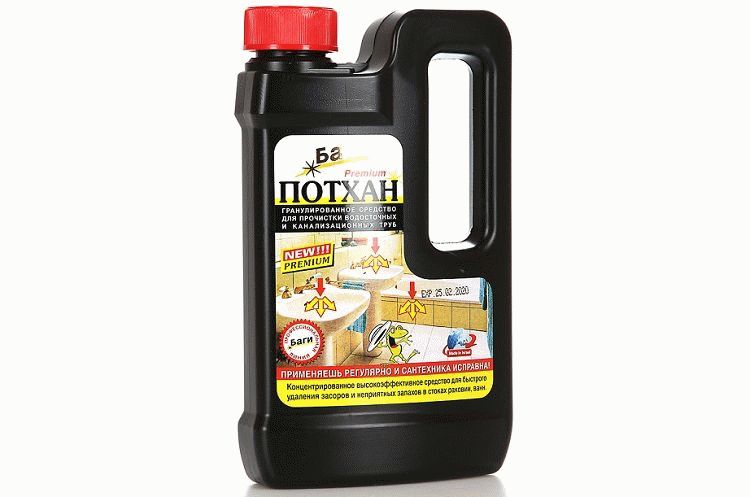
Granular cleaning agent. The active ingredients are caustic soda and caustic potassium.The purpose of the drug is to clean metal and plastic sewer pipes.
Household chemicals should be used as directed to prevent leakage.
Turbo tire
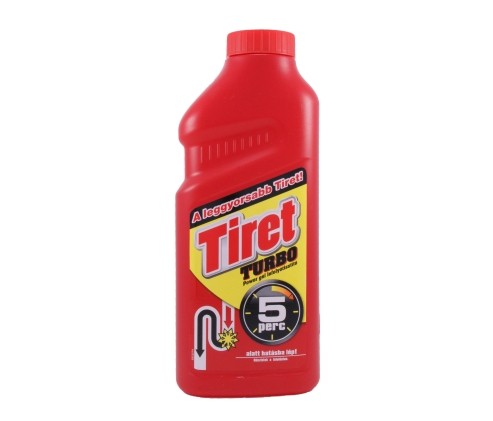
Tiret Turbo is designed to clean traps, kitchen sinks, dishwashers and washing machines. The active ingredient is chlorine (5-15%).
Cleaning should be done with good ventilation and avoid smoking.
“freezing minutes”
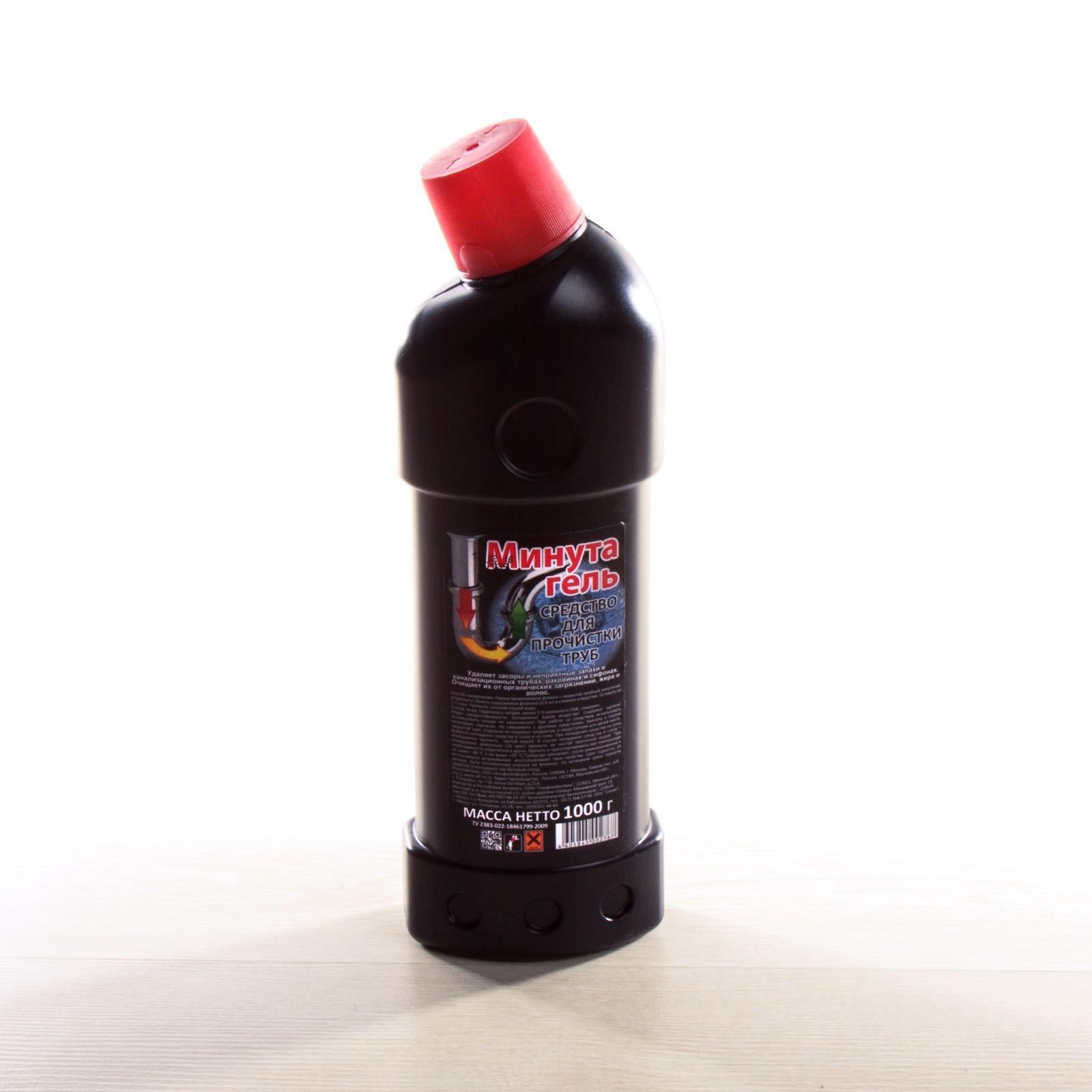
Means for removing blockages of organic deposits in pipes and siphons. The main components are caustic sodium alkali, glycerin and surfactants.
One container is designed for 2 stages of cleaning.
Hyphen

The release form of the cleaning agent is gel-like. Active ingredients - chlorine, surfactants. The gas and foam released during the oxidation reaction loosens the garbage plug, allowing it to be removed with warm water pressure.
It is recommended to use substances containing chlorine in ventilated areas.
Folk recipes for cleaning
Home remedies can be used to clear blockages and for prevention purposes.
soda and vinegar
Baking soda and vinegar interact with the release of large amounts of foam and carbon dioxide. First, soda is poured into the drain hole, then vinegar is poured. Ratio: 1/3 bag of soda to 1/4 bottle of 9% vinegar. At the end of the gas evolution, the siphon and the pipes are rinsed with a large quantity of water under pressure.
Solution of soda and salt
A high concentration saline solution corrodes all organic compounds. Soda has disinfectant and cleansing properties. Salt and soda poured into the drain hole in equal proportions suppress the action of putrefactive bacteria, destroy the organic plug and destroy the unpleasant odor.
Boiling water
100 degree water washes away all grease deposits, preventing clogging. The amount of water for effective rinsing is at least 5 liters.
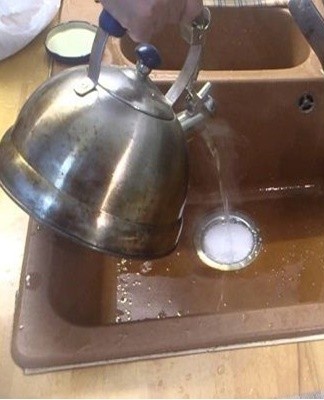
caustic soda
Pure caustic soda is an aggressive substance.
It should be used to clean the pipes, observing the safety precautions:
- latex gloves;
- eyeglasses;
- in a well-ventilated place.
When alkali dissolves in water, a large amount of heat is generated, which must be taken into account when using it.
lemon acid
A high-concentration citric acid solution destroys organic layers, in particular, it can damage plastic pipes, the siphon, the surfaces of plumbing fixtures.
Alka-Seltzer tablets
Medicine containing citric acid and sodium carbonate (effervescent tablets).A large amount of carbon dioxide is emitted into the water, which can loosen the drain plug in the trap or pipe.
Washing powder
Hot water spray and washing powder are an effective way to eliminate fatty deposits.
How to determine the location of the blockage
Stagnation of water in the sink, bathtub, toilet bowl is a sign of a blocked siphon or drain. The place of location is determined by the operation of the drainage system. If the water overflows immediately after opening the tap, the siphon is clogged. When the overflow occurs after a few seconds, it means that a plug has formed behind the knee.
Mechanical methods
Auxiliaries are used with household chemicals when the blockage is insignificant or the paper, large food residues have seeped into the cork.
Ventuz
A plunger is used to pump water into a siphon, creating a mini water hammer. A mechanical device is used with a pipe diameter of up to 50 millimeters.
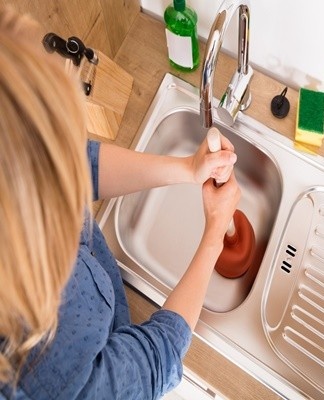
A vacuum
A reverse draft vacuum can be used to create air pressure which increases water pressure in the system to remove deposits.
plumbing cable
The removal of the waterproof cap is carried out using a steel cable. With a clockwise rotational movement, it is fed into the opening of the siphon and the pipe until it stops, until the drain is freed from the joint.
Dismantling and cleaning the siphon
A blockage in the trap can be cleared by unscrewing the elbow and removing the debris. Then all parts of the siphon and the pipe are washed, degreased and restored to their original form.
Hydrodynamic cleaning methods for private homes
To remove accumulations in the sewer pipes of private households, hydrodynamic cleaning is used.
The system is supplied with water at a pressure of 250 bar through a hose, eliminating deposits of sand, grease and silt. It is ineffective for petrified deposits.
How to get rid of the smell
The cause of an unpleasant smell in the toilet, bathroom, kitchen is rotting garbage cans in the siphon or leaking joints. Removing deposits and repairing pipes is the only way to get rid of unpleasant fumes.
Prophylaxis
To avoid contamination of the drainage system, you must:
- Place the mesh over the drainage holes.
- Degrease the entire system once a year by dismantling the siphons.
- After soap, shampoo, greasy dishes, rinse the drain with hot water under pressure.
Sewer lines are not intended for flushing large, slightly soluble objects and substances.



